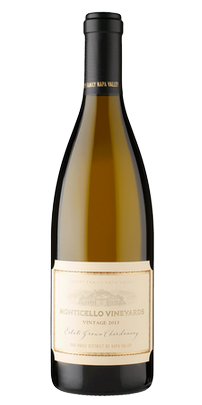
2013 Estate Grown Chardonnay
MONTICELLO VINEYARDS
Our Chardonnay offers aromatics of citrus and green apple which are complemented by a very slight butterscotch aroma and a subtle layer of oak creaminess.
 Click Here to download Tasting Notes
Click Here to download Tasting Notes
 Click Here to download Recipe
Click Here to download Recipe
Currently Available
Wine Specs
Vintage
2013
Varietal
Chardonnay
Appellation
Oak Knoll District
Vineyard Designation
Estate Grown
Alcohol %
14.1
Wine Profile & Ratings
Vineyard Notes
Since the early 1990s our Chardonnay vineyard in the Oak Knoll district of Napa Valley is planted with four different clones of Chardonnay (our Heirloom Clones and Dijon Clones #76, #95, #96) plant to 420A rootstock, 101-14 and 5c from which we produce Chardonnay grapes with rich bright fruit flavors. Soils are Pleasanton and Yolo Series Loam.
Our Monticello Vineyards designated Chardonnays are a great example of how the different clones, rootstock, and soil combinations specific to our vineyard create a most harmonious wine. Although we work with the same estate vineyard blocks each vintage, it is always interesting to see how they conduct themselves in any given season. They adapt to the season, and so do we. The differences in each growing season are what makes winemaking so fascinating, and these seasonal differences are one reason why the blends shift from year to year even though the grapes come from the same field. The result is a fully ripe, lower alcohol, extremely well balanced wine that should show well for several years.
The wine was fermented in new French Oak and stainless steel and aged for 8 months in new and neutral French Oak Barrels (about 1/3 new).
12+ Months in French Oak.
Since the early 1990s our Chardonnay vineyard in the Oak Knoll district of Napa Valley is planted with four different clones of Chardonnay (our Heirloom Clones and Dijon Clones #76, #95, #96) plant to 420A rootstock, 101-14 and 5c from which we produce Chardonnay grapes with rich bright fruit flavors. Soils are Pleasanton and Yolo Series Loam.
Our Monticello Vineyards designated Chardonnays are a great example of how the different clones, rootstock, and soil combinations specific to our vineyard create a most harmonious wine. Although we work with the same estate vineyard blocks each vintage, it is always interesting to see how they conduct themselves in any given season. They adapt to the season, and so do we. The differences in each growing season are what makes winemaking so fascinating, and these seasonal differences are one reason why the blends shift from year to year even though the grapes come from the same field. The result is a fully ripe, lower alcohol, extremely well balanced wine that should show well for several years.
The wine was fermented in new French Oak and stainless steel and aged for 8 months in new and neutral French Oak Barrels (about 1/3 new).
12+ Months in French Oak.
Since the early 1990s our Chardonnay vineyard in the Oak Knoll district of Napa Valley is planted with four different clones of Chardonnay (our Heirloom Clones and Dijon Clones #76, #95, #96) plant to 420A rootstock, 101-14 and 5c from which we produce Chardonnay grapes with rich bright fruit flavors. Soils are Pleasanton and Yolo Series Loam.
Our Monticello Vineyards designated Chardonnays are a great example of how the different clones, rootstock, and soil combinations specific to our vineyard create a most harmonious wine. Although we work with the same estate vineyard blocks each vintage, it is always interesting to see how they conduct themselves in any given season. They adapt to the season, and so do we. The differences in each growing season are what makes winemaking so fascinating, and these seasonal differences are one reason why the blends shift from year to year even though the grapes come from the same field. The result is a fully ripe, lower alcohol, extremely well balanced wine that should show well for several years.
The wine was fermented in new French Oak and stainless steel and aged for 8 months in new and neutral French Oak Barrels (about 1/3 new).
12+ Months in French Oak.
Winemaker Notes
On the palate, the wine is rich, yet restrained with a striking, full texture. Its full-bodied creaminess maintains a steady beam of brightness through the middle to keep it focused and alive all the way to the finish.
Food Pairing Notes
Grilled Chicken, Creamy Pasta Dishes, Flakey White Fish